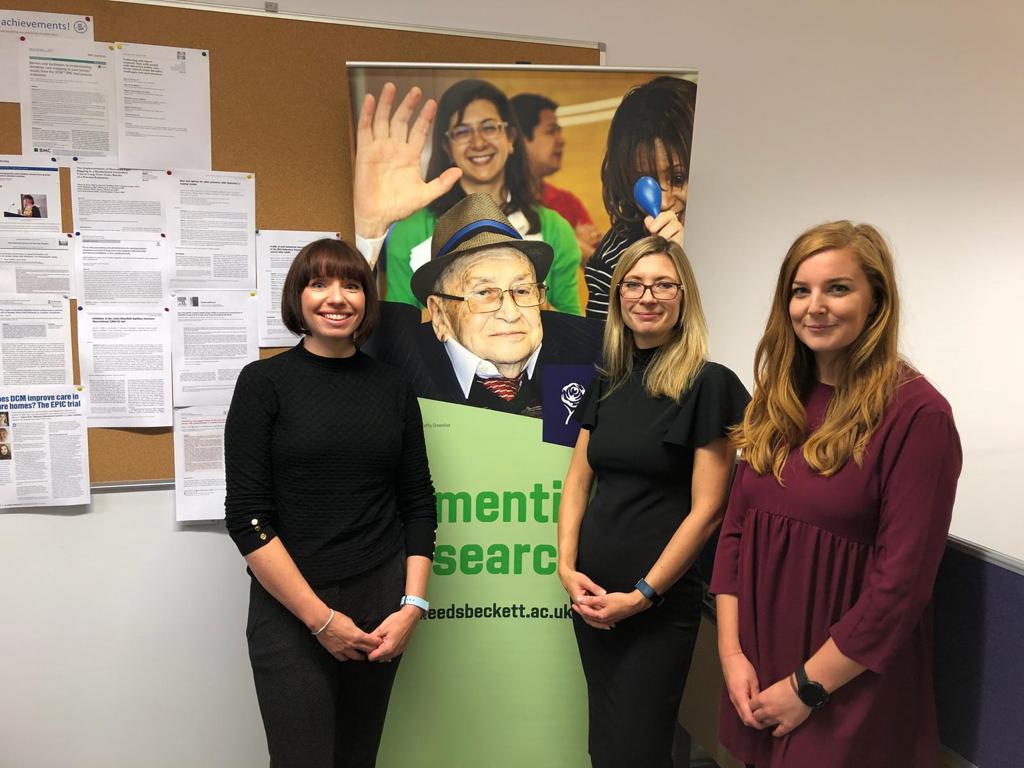Identifying approaches, barriers and facilitators to visiting in care homes during the COVID-19 pandemic

ENRICHEnabling Research in Care Homes
GUEST BLOG
Identifying approaches, barriers and facilitators to visiting in care homes during the COVID-19 pandemic
The research team are: Prof Claire Surr, Dr Rachael Kelley, Dr Alys Griffiths, (all pictured) Dr Sarah Smith, Prof Anne-Marie Bagnall, Rebecca Platt and Olivia Robinson.
The topic of care home visiting has been the source of much discussion and debate in the news and on social media since the start of the COVID-19 pandemic. Visiting has been restricted and care homes have adopted various practices to support ongoing contact between residents with dementia and their family members. Some of these may be more successful than others and may work better for some residents than others. This blog gives an overview of a study, being conducted by researchers at Leeds Beckett University, which aims to explore these issues in more detail, and how care home staff, managers and owners can take part.

Identifying approaches, barriers and facilitators to visiting in care homes during the COVID-19 pandemic
The topic of care home visiting has been the source of much discussion and debate in the news and on social media since the start of the COVID-19 pandemic. From March 2020 most care homes stopped usual face-to-face visiting from relatives and friends, limiting contact between care home residents with dementia and their families in efforts to prevent COVID-19 outbreaks in care homes. Care homes have had to adopt a variety of approaches to support ongoing contact in COVID safe ways, including telephone calls, digital methods, window visits and creating COVID safe spaces where families can visit from behind a Perspex screen or at a social distance in gardens. More recently, a small number of care homes opened up face-to-face visits using lateral flow testing and the wearing of Personal Protective Equipment (PPE).
A recent government policy change has indicated this type of face-to-face visiting should now happen in all care homes for a single named visitor. However, this may be being put into practice in different ways by care homes, as they seek to interpret and implement the policy in ways that are feasible for them. In addition, for many family members or friends of care home residents, who are not the single named visitor, contact with the resident remains limited to other virtual or socially distanced methods.
Many of these approaches can be extremely difficult for people with dementia to engage with (due to not understanding why they cannot touch/hug their relative, why they are behind a screen, wearing a mask etc) and gain comfort from. They may cause more distress than well-being for some residents and may be impossible for those with advanced dementia to take part in. This can cause distress for the resident, their visitor and for staff who have to support them.
At the Centre for Dementia Research, at Leeds Beckett University, are undertaking a study exploring these issues. We aim to identify and disseminate best practice approaches to supporting visiting of care homes residents with dementia, including what methods are being used, which seem to work best for whom and the resources care homes need in place to support the practices that seem to work best.
So far we have undertaken a scoping review of current practice which has involved looking at government and local policies and how these have been interpreted and implemented by a sample of care home providers. We have also looked at accounts of visiting practices and their impacts on social media, in the news and in other publicly available sources. We have found widespread variability in the interpretation and implementation of the frequently changing Government guidance.
The next phase of our study involves gathering information from relatives and friends of care home residents with dementia, care home managers and staff and those who own or work in senior positions within care provider groups. We are doing this through a survey asking for peoples’ experiences of visiting practices and their impacts, and by conducting a small number of interviews with people from these groups to explore these issues in more depth.
We would therefore love to hear from you if you are:
- A relative or friend of a person living with dementia/memory problems in a care home in England during the COVID-19 pandemic
- A member of staff currently working in a care home in England and who has supported one or more resident’s with dementia during any type of family/friend visiting/contact
- A care home manager of a care home in England that provides care for residents with dementia
- A senior manager/Director/ owner of a care home or group of homes in England that provides care to residents with dementia
Taking part involves completing a survey that asks about your experiences of and views on care home visiting during the COVID-19 pandemic. It should take you about 20 minutes to complete. All answers are anonymous.
To read more information about the survey and to participate click here